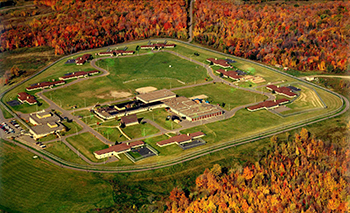Wisconsin Lawmakers Push For Juvenile Detention Reform
 IRMA, Wis. — The Lincoln Hills School for Boys and Copper Lake School for Girls, both located near Irma, have been in the headlines recently for the alleged use of excessive force by staff and administrators against the juvenile offenders. A Department of Justice investigation into the matter also turned up allegations that certain staff and administrators covered up incidents of abuse by destroying or simply not filing the necessary reports. The facilities house primarily serious youth offenders with histories of abuse.
IRMA, Wis. — The Lincoln Hills School for Boys and Copper Lake School for Girls, both located near Irma, have been in the headlines recently for the alleged use of excessive force by staff and administrators against the juvenile offenders. A Department of Justice investigation into the matter also turned up allegations that certain staff and administrators covered up incidents of abuse by destroying or simply not filing the necessary reports. The facilities house primarily serious youth offenders with histories of abuse.
Approximately 10 facility workers were placed on paid leave in mid-December after allegations arose that security staff had been using excessive force on the juvenile inmates in their care. Additionally, both the state’s Juvenile Corrections Administrator Paul Westerhaus, and John Ourada, superintendent of Lincoln Hills School, were relieved of their posts by Department of Corrections Secretary Ed Wall following an almost year-long investigation of the facility. Wall also requested a review of all cases within the last five years that involved force used against a youth in custody. The review is intended to determine if staff would benefit from added training on de-escalation techniques and incident documentation.
Following their Dec. 21 visit with youth, staff and administrators at the facilities, State Representatives Mandela Barnes, D-Milwaukee, and Evan Goyke, D-Milwaukee, are now calling for broad reforms to the state’s juvenile detention and correction system. Goyke, who serve as the ranking member on the state’s Assembly Criminal Justice Committee, and Barnes, the ranking Democrat on the Assembly Corrections Committee, were among the first lawmakers to tour the facility after allegations of abuse and potential criminal behavior first came to light.
In a statement, Barnes, took aim at current Wisconsin Governor Scott Walker, highlighting what he calls “mismanagement” on the part of the Governor and Walker’s GOP counterparts. Barnes pointed out that state Republicans were made aware of the reports of unsafe behavior and what he called “a toxic environment” at Lincoln Hills a year ago, but failed to act on “system failures” that put youth in harm’s way.
“It is time to stand up and demand answers and provide solutions to fix our broken corrections systems and ensure the safety of youth, inmates and staff at Lincoln Hills and other facilities across our state,” Barnes said in a statement.
“Swift remedial action is necessary to ensure the safety of children and staff at Lincoln Hills,” Goyke added in a statement. “This must involve the immediate addition of trained staff to reduce the staff-to-child ration and alleviate the overworked staff. Lincoln Hills desperately needs additional staff resources, not just forced overtime, to address the real safety issues that continue to exist.”
Goyke added that the state needs to engage in an “honest debate about juvenile corrections in Wisconsin,” and has proposed the state adopt what he calls the more effective and efficient juvenile treatment and rehabilitation model pioneered by the state of Missouri. The Missouri Model, which focuses on smaller facilities that keep youth closer to home and support systems, might also help curb Lincoln Hills “alarmingly high” recidivism rates, which are putting unsustainable financial strain on the department, according to Goyke.
“By utilizing small facilities closer to home, this model has produced better outcomes at a lower cost,” Goyke said in a statement. “By adopting the ‘Missouri Model’ we can create real reform in our juvenile corrections system and create a safer environment for youth and staff all across our state.”






